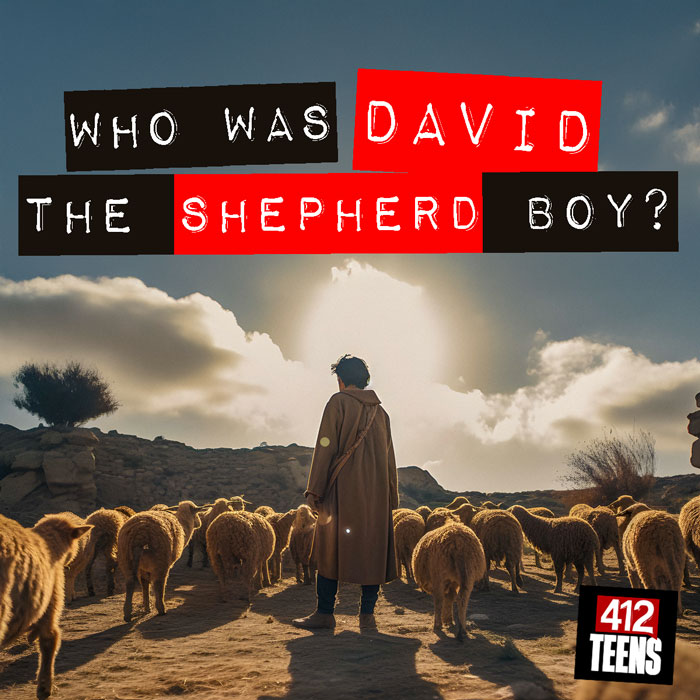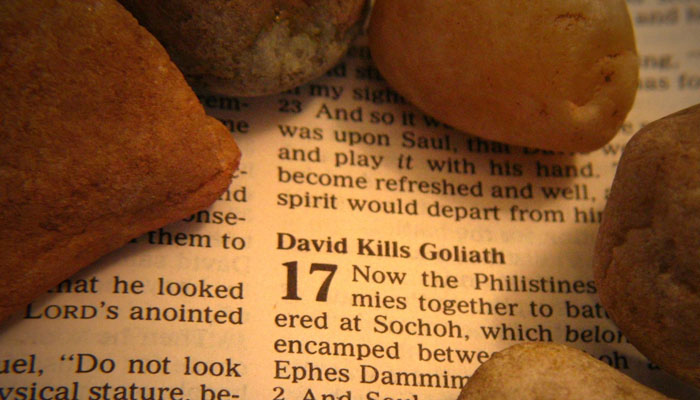Who was David the shepherd boy?

A young boy from a lowly family defeats a giant and rises as a mighty warrior, eventually becoming a king. Sounds like the plot of an action movie, right? This describes the true story of David, King of Israel. Because of the action, heartache, drama, and redemption in David's life, many have sought to bring his story to life through movies, books, or TV shows. While these depictions can help us learn and consider possible aspects about David's life, it is important to return to the Bible itself to separate fact from fiction.
You can read the true account of David's life starting in 1 Samuel 16, going through 2 Samuel, and into 1 Kings 2. More tales of David's exploits can be found in 1 Chronicles, and you can also learn about his life by reading David's numerous poems and songs collected in the book of Psalms. For this article, we'll focus on the early part of David's life.
David: The Shepherd Boy
David is first introduced as a very young shepherd, around the age of 12-16 years old. His father's name was Jesse, but no significant information is recorded in the Bible about his mother—not even her name. David and his family lived in the city of Bethlehem and were of the tribe of Judah. He was youngest of eight brothers and had at least two sisters.
The king of Israel at the time was called Saul. He was their very first king, appointed by God at the relentless demand of the Israelites (1 Samuel 8:5, 10:1). But the Lord had rejected Saul as king because the man had turned away from Him and no longer sought to obey God's authority (1 Samuel 15:11). Following God's command, the prophet Samuel went to the family of Jesse to anoint a new king over Israel (1 Samuel 16:10, 13).
When Samuel saw the oldest son of Jesse, this eldest son must have appeared very strong and impressive. Samuel thought to himself, "Surely this is the one!" But God said, "Do not look on his appearance or on the height of his stature, because I have rejected him. For the LORD sees not as man sees: man looks on the outward appearance, but the LORD looks on the heart" (1 Samuel 16:6-7).
One by one, each of Jesse's sons stood before Samuel, and one by one, the Lord rejected all who were present. Samuel then asked if there were any more sons. Jesse admitted that he had one more—the youngest. But that he was away, tending to the sheep (1 Samuel 16:8-11).

When David was brought before Samuel, God told the prophet, "Arise, anoint him, for this is he." Samuel anointed the young shepherd with oil right in front of his brothers and father, and the Spirit of the Lord left the current king and rushed upon David (1 Samuel 16:12-13). Although David was anointed as king on that day, he wouldn't sit on the throne until around 15 years later. Meanwhile, God allowed his life to be filled with many adventures and different trials.
Unfortunately for King Saul, when God's Spirit left, it was replaced by a harmful spirit that tormented him. He called to his servants to find someone to play music for him to drive away the spirit. They thought of Jesse's youngest son, because he was known to play the lyre very well, was a man of valor, and had the Lord with him. So Saul for sent for David to come into his service. Saul loved him greatly, and David became his armor-bearer. Whenever Saul was tormented by the evil spirt, David would play music to help him feel better (1 Samuel 16:14-23).
David: Trusting God Amid Giants
One of the things David is probably most well-known for his battle with the Philistine giant called Goliath (1 Samuel 17). The Philistines were an aggressive, warmongering people who occupied territory southwest of Israel, and at that time, they had been enemies of Israel for nearly 200 years. David was about to change history.
For forty days, Goliath proposed a dual between himself and whoever would fight him from the army of Saul. But Saul's soldiers ran away in great fear when they saw the Philistines' mighty champion. See, the Bible records that Goliath was over nine feet tall, wore an impressive set of heavy bronze armor, carried a huge javelin, and had a shield bearer that went out ahead of him (1 Samuel 17:1-7).
Three of David's brothers were in Saul's army, and Jesse sent young David to the battlefield with food for them and the commander, plus a request to bring back news of how they were doing (1 Samuel 17:12-18). While David chatted with his brothers, he overheard Goliath's challenge. He wondered aloud why no one was stepping up to defend the honor of Israel and of the Lord, yet his brothers scoffed and accused him of being childish (1 Samuel 17:23-28).
None had the courage to fight Goliah—except David. So David went to Saul to tell him that he would fight Goliath. At first, Saul thought that David was not qualified to fight Goliath because he was so young. But David told Saul that the Lord would deliver him.

"David said to Saul, 'Your servant used to keep sheep for his father. And when there came a lion, or a bear, and took a lamb from the flock, I went after him and struck him and delivered it out of his mouth. And if he arose against me, I caught him by his beard and struck him and killed him. Your servant has struck down both lions and bears, and this uncircumcised Philistine shall be like one of them, for he has defied the armies of the living God... The Lord who delivered me from the paw of the lion and from the paw of the bear will deliver me from the hand of this Philistine.' And Saul said to David, 'Go, and the Lord be with you!'" —1 Samuel 17:34-37
Taking only his shepherd's staff, a sling, and five stones, David approached Goliath. The giant hated the sight of the youth and mocked him horribly. But David stood strong, proclaimed again that the Lord would give Goliath into his hand, and declared that the battle was the Lord's. David dropped a stone in his sling and swung. With one rock, he hit the giant on his forehead, causing him to fall facedown. David, having no sword, then took the Philistine's sword from its sheath and killed him (1 Samuel 17:38-51).
David: The Friend
After that epic showdown, David came into the service of the king full time, leaving his shepherding duties behind. He soon met and befriended Saul's son, Jonathan. They became the best of friends—"one in spirit" (1 Samuel 18:1). Their friendship is a model for our own friendships today. Jonathan would have been the natural heir to the throne, yet he accepted God's plan, supporting and even protecting his friend David (1 Samuel 18:1-4, 19-20). They showed humility and selfless love for one another (1 Samuel 18:3; 20:17).
David: The Warrior & Fugitive
David's accomplishments as a warrior grew. So much so that the women of Israel began to sing that, while Saul had killed thousands, David had slain tens of thousands. Even though Saul had once treasured David, he became very envious of the attention David was receiving. Saul soon began plotting ways to kill him (1 Samuel 18:6-16). He tried pinning him to the wall with his spear (1 Samuel 18:10-11), sending messengers to his house to watch for an opportune time for assassination (1 Samuel 19:11), and chasing him multiple times over many miles to try and kill him.
David had not forgotten that he was to be the next king over Israel, but he didn't raise a hand against Saul. He knew that Saul was God's first anointed king, so he waited patiently for God's timing to bring him to the throne. With Jonathan's help, he ran for his life, now a fugitive and alone (1 Samuel 20). But during this time, David raised up a mighty army and the defeated enemies of Israel and enemies of the Lord.
David: The Poet
Many of the Psalms that David penned came from this difficult time in his life (Psalms 34, 52, 54, 56, 59). While he pours out many sorrows, struggles, and grievances to the Lord, he also recalls and leans on God's power, protection, love, and guidance for strength. As we read his psalms today, they are a reminder that we can be honest with God about how we truly feel. We're allowed to acknowledge our hurt and frustration while we suffer trials, while also looking to our Heavenly Father for strength and peace.
David: The King (a teaser)
Saul eventually died in battle against another enemy of Israel, along with his son Jonathan, and David was publically anointed king over the area of Judah in Israel. Life was not as easy as all that though, as David was immediately met with oppression that lasted decades...
Continued in part 2: Who was David the King? [COMING SOON!]
ALSO SEE:
- Why is it important to study Bible characters?
- Is the Bible a fairy tale?
- Does archaeology support the Bible?
- Is the Bible a reliable record of the original manuscripts?
- Why does God allow the innocent to suffer?
- What does the Bible say about loneliness?
- What is true friendship?
- Can I have friends of the opposite gender?
- What is the human heart?
- What does it mean to delight in the Lord?
- Blessed is the Man


TL;DR
The events of King David's life can primarily be found in the books of 1 and 2 Samuel. David started out as a young shepherd in Bethlehem. He was anointed as king by the prophet Samuel between the ages of 12 and 16, but didn't become king until around 15 years later. Meanwhile, God allowed his life to be filled with many adventures and different trials, such as one of David's most well-known conquests: killing the giant Goliath (1 Samuel 17). David soon became a famous and respected warrior of Saul's army, which made Saul jealous. While Saul kept attempting to have David killed, God protected David's life. During this time, David wrote many poems and songs that can be found in the book of Psalms, where he poured his heart out to God and reflected on God's mighty character. David eventually became king of Israel at the age of 30.

Writer: Hanna S.
Hanna loves spending time with kids and teens. She enjoys being detectives with them to investigate God's Word to discover truths to answer any questions. She is the co-author of a newly published apologetics curriculum for children and teaches one online for highschoolers-adults. To learn more about her ministry you can visit networkerstec.com. For fun, she likes to play Ultimate Frisbee, read historical fiction, and paint.
